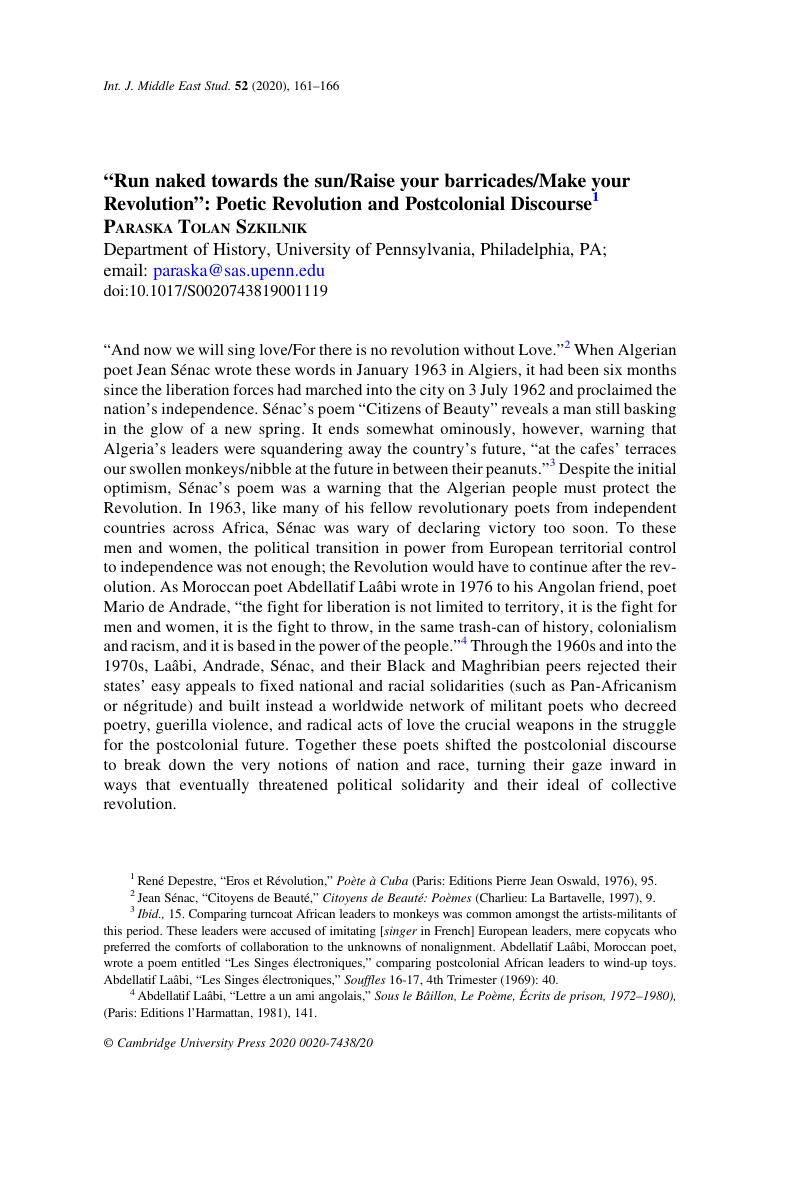No CrossRef data available.
Published online by Cambridge University Press: 04 March 2020

René Depestre, “Eros et Révolution,” Poète à Cuba (Paris: Editions Pierre Jean Oswald, 1976), 95.
2 Sénac, Jean, “Citoyens de Beauté,” Citoyens de Beauté: Poèmes (Charlieu: La Bartavelle, 1997), 9Google Scholar.
3 Ibid., 15. Comparing turncoat African leaders to monkeys was common amongst the artists-militants of this period. These leaders were accused of imitating [singer in French] European leaders, mere copycats who preferred the comforts of collaboration to the unknowns of nonalignment. Abdellatif Laâbi, Moroccan poet, wrote a poem entitled “Les Singes électroniques,” comparing postcolonial African leaders to wind-up toys. Abdellatif Laâbi, “Les Singes électroniques,” Souffles 16-17, 4th Trimester (1969): 40.
4 Laâbi, Abdellatif, “Lettre a un ami angolais,” Sous le Bâillon, Le Poème, Écrits de prison, 1972–1980), (Paris: Editions l'Harmattan, 1981), 141Google Scholar.
5 Sayda Bourguiba, “Finalités culturelles et esthétiques d'un cinéma arabo-africain en devenir: Les Journées Cinématographiques de Carthage (JCC)” (PhD thesis, Université Panthéon-Sorbonne - Paris I, 2013); Byrne, Jeffrey James, Mecca of Revolution: Algeria, Decolonization and the Third World Order, (Oxford: Oxford University Press, 2016)CrossRefGoogle Scholar; Brahim El Guabli, “Refiguring Pan-Africanism through Algerian-Moroccan Competitive Festivals,” International Journal of Postcolonial Studies 20, no. 7: 1053–71; Meghelli, Samir, “‘A Weapon in Our Struggle for Liberation’: Black Arts, Black Power, and the 1969 Pan-African Cultural Festival,” in The Global Sixties in Sound and Vision: Media, Counterculture, Revolt, ed. Brown, Timothy Scott and Lison, Andrew (New York: Palgrave Macmillan, 2014)Google Scholar; Meghelli, Samir, “From Harlem to Algiers: Transnational Solidarities between the African American Freedom Movement and Algeria, 1962–1978,” in Black Routes to Islam, ed. Marable, Manning and Aidi, Hishaam (New York: Palgrave Macmillan, 2009)Google Scholar; Mokhtefi, Elaine, Algiers, Third World Capital: Freedom Fighters, Revolutionaries, Black Panthers (London: Verso, 2018)Google Scholar; Ben Salama, Alger: La Mecque des Révolutionnaires, 56 minutes, 2016, Arte France.
6 This is the subject of the author's dissertation currently in progress at the University of Pennsylvania.
7 In 1953, Mário de Andrade and his Sao Toman friend Francisco Tenreiro published the cuaderno “Poesía Negra de Expressao Portuguesa,” with the intention of publicizing a specifically Luso-African form of négritude. See Mario de Andrade, “Poesia Negra de Expresso Portuguesa (Cuadernos de Poesia),” May 1953, Arquivo Mario Pinto de Andrade, Fundaçao Mario Soares, http://casacomum.org/cc/visualizador?pasta=04354.006.002#!11.
8 René Depestre, “L'intellectuel révolutionnaire et ses responsabilités envers le Tiers-Monde,” Souffles 9, 1st Trimester (1968): 45.
9 Ted Joans, letter to André Breton, 5 May 1966, Bibliothèque Littéraire Jacques Doucet.
10 Ibid.
11 Jean Sénac, “Citoyens de Beauté,”
12 Abdellatif Laâbi, “Lisez ‘Le Petit Marocain,’” Souffles 2, 2nd Trimester (1966): 7.
13 Mario de Andrade, “Culture et Lutte Armée,” Souffles 9, 1st Trimester (1968): 54.
14 Abdellatif Laâbi, “Prologue,” Souffles 1, 1st Trimester (1966): 6.
15 Kenza Sefraoui, La Revue Souffles, 1966–1973: Espoirs de Révolution Culturelle au Maroc, (Rabat: Editions du Sirocco, 2013); Kai Krienke, Jean Senac, Poet of the Algerian Revolution (PhD Diss., Graduate Center City University of New York, 2014); Rene Depestre, interview with author, 13 December 2017 in Lézignan-Corbières, France.
16 René Depestre, “Eros et Révolution,”
17 Joans, Ted, “My Trip,” Afrodisia, (New York: Hill and Wang, 1970), 64Google Scholar.
18 Rene Depestre, interview with author, 13 December 2017 in Lézignan-Corbières, France.
19 René Depestre, “Eros et Révolution,”
20 Jean Sénac, “Citoyens de Beauté,”